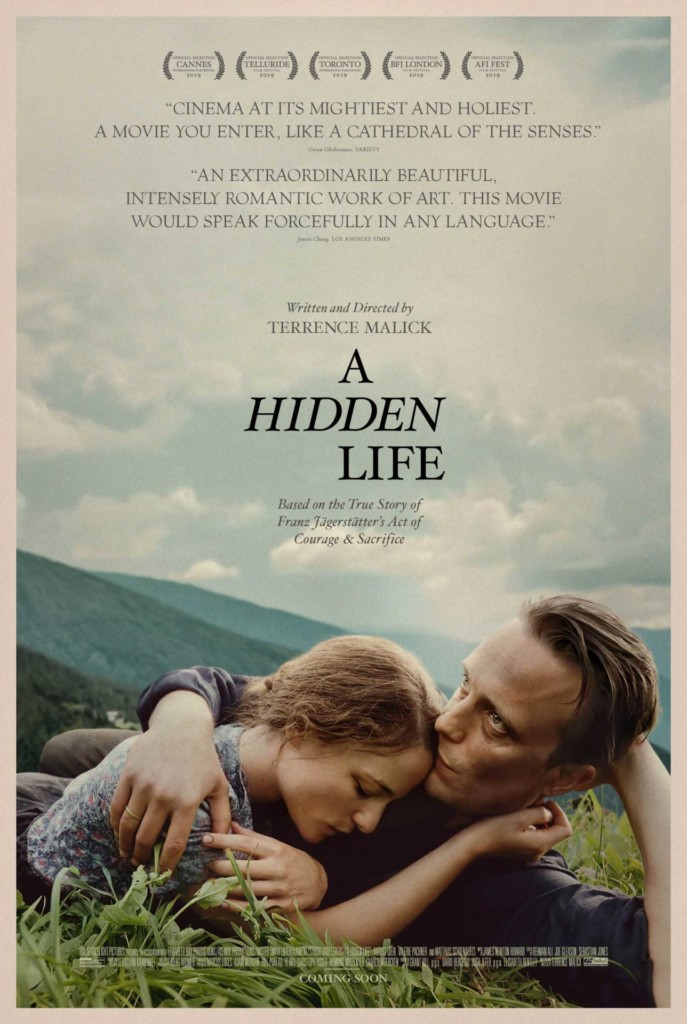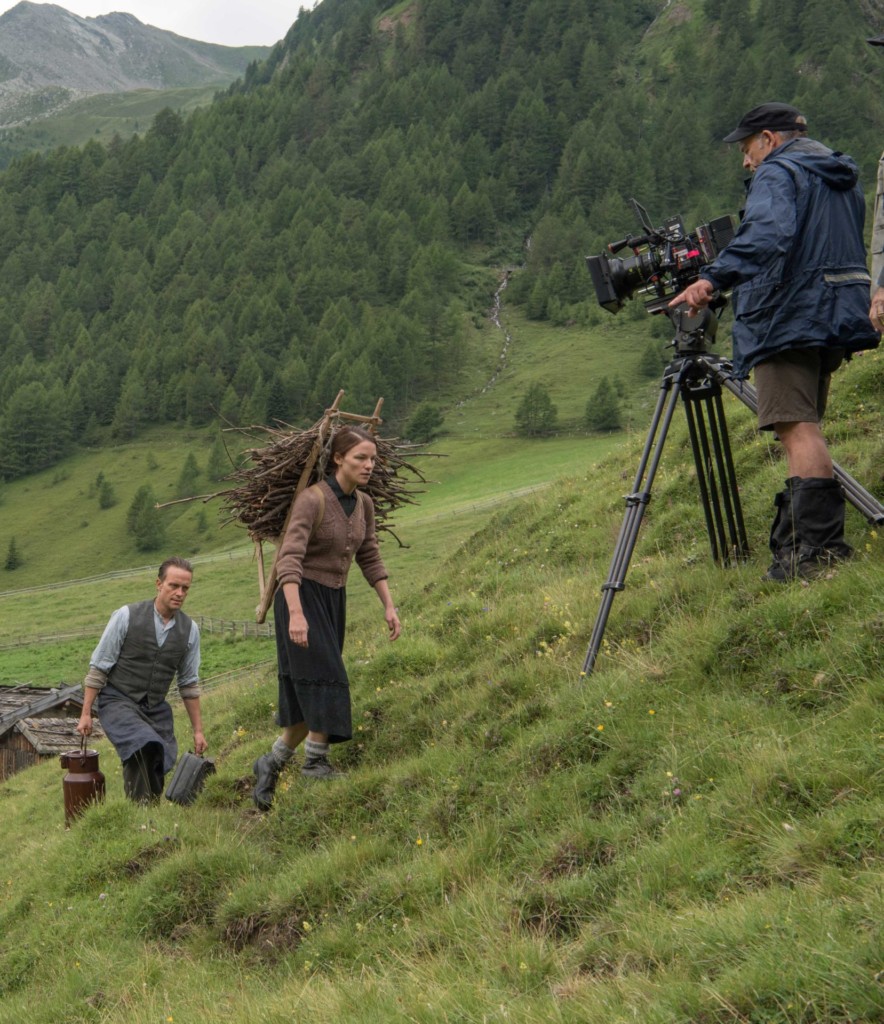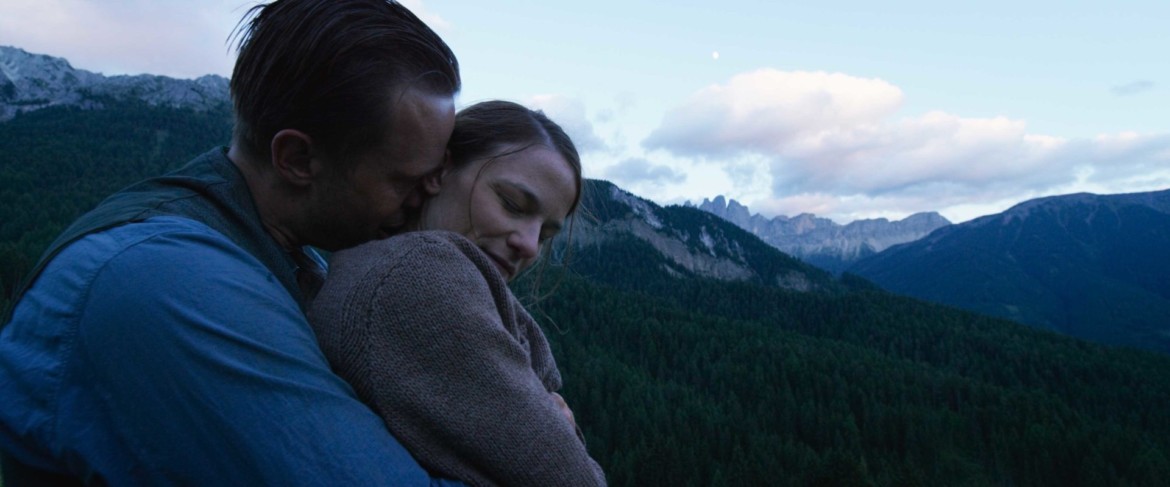By Kirsten Coachman
Faith and love are at the forefront of writer/director Terrence Malick’s new epic, “A Hidden Life.” The film, out in theaters this weekend, is based on actual events surrounding an Austrian peasant farmer, Franz Jägerstätter (August Diehl), who, during World War II, refused to swear loyalty to Adolf Hitler and the Third Reich.
Set against lush, gorgeous landscapes, the film’s setting provides a sense of serenity while the Jägerstätter family copes with the repercussions of Franz’s resistance, including within their own St. Radegund village community.
Playing his ever-faithful wife Fani, Austrian actress Valerie Pachner encompasses the wear of a young woman trying to be strong for the couple’s three daughters in the face of uncertainty while Franz is imprisoned in Berlin. Franz and Fani’s love and support for each other, expressed throughout the film in letters they write to one another (drawn from real-life correspondence between the couple) and narrated by the actors, is always on full display.
Both breathtakingly beautiful and absolutely devastating, “A Hidden Life” is a moving portrait of quiet courage that resonates in today’s world. Art U News sat down with Pachner last month to learn more about her experience during the making of the film.

When you first learned about the film, what appealed to you most about being able to tell this story?
I think what appealed [to me] most was certainly that these are two people who know so well what is right in their hearts and they have the courage to follow that. And to stand up for that, even though it means a lot of suffering and a lot of pain. And I just liked the idea of putting morals above surviving instincts and that human beings are capable of that.
And certainly, another thing was the love that they share. I feel like it’s sort of at the core of the story because that love makes it for both of them possible to go through that together, that this togetherness is so strong and that you realize love is stronger than death and pain.
When it came to working with your director, Terrence Malick, what was your first conversation or meeting with him like?
The first time he called me was a year before the shoot. The casting was a year before the shoot. I realized from the first moment that we talked, it was really like deep talk and no small talk right away. I didn’t meet him in person until like three days before the shoot. And then we were just mostly talking about the world and life and whatever [laughs], and mostly talking about [the characters’] life and their love. We didn’t have crazy philosophical talks about it. It was really more like a very grounded way to look at it.
Being that the film is based on this real-life couple, were you given any specific research to do prior to shooting to kind of dig in a little bit more about your character?
What [Terrence] sent me, the first thing, was the letters—the collection of letters between the two. And those turned out to be the most important thing for both preparation and during the shoot because you can draw so much from the letters already, you can read the way they think about their life, about their love, about their faith. You can also get a sense of how their everyday routine was because of how he was working on a farm. So that was very important. Another thing that was important was a documentary that I watched—the documentary was very hard to find. It’s called “The Widow of the Hero.” And there’s an interview with her, where she’s 96—she turned 100 years old—and she’s this old, fragile lady, but she’s not broken. She beams and she’s happy, although she’s gone through so much. That was so important for me, because I think that was probably one of the things where I would have reacted differently. That was important for me to know, for the shoot, that even though she has to go through such hardship, she doesn’t lose faith in the good, and of life.
And then, the other thing was the physical side of things.
Ah, yes.
[Laughs] I had to learn how to use a scythe and how to milk a cow and churn butter and shear a sheep. I spent like three weeks before the shoot—I went to a farm close to Radegund, actually, just on the German side of the border. I grew up on the countryside not far from Radegund and my grandparents were farmers, so I sort of know that world, which was great. I think for me, I didn’t have to dig into that because I already knew that. But it was good to reconnect. It’s just different when you are in the city or in the countryside. You’re differently connected with the world when you are like standing in a field, the sky above you, and it’s just different. I felt like it was important for the character to be very connected with nature and be very grounded yet have a certain feel for something that is bigger than that. And I felt like that the connectedness with nature informs that the most or is important for that part of her character.
You mentioned the physicality, and there’s a lot of that with this role. I read that the film was shot in much longer takes, and being that this is such a physical role, did the longer takes allow you to naturally settle into character?

Certainly, the way of filming, with the long takes, with the wide angles where we can just move about with the set being fully equipped. We felt like a playground—that really helped to really dive into the world and really, you forget about acting, it was more like we were farmers. Even in the morning, we would say things like, “Oh, I feel ready to milk the cow.” It was really us being farmers and the acting sort of happened in between, and also working with the animals and with the children also helped [to stay] close to a very authentic, natural way. We almost had no breaks, only the lunch break, because [we filmed in] only natural light, [so] no breaks for change of lighting. I really felt every night I would wash off the dirt from the day. I remember feeling like “wow, I’m really living more her life than mine at the moment,” because I was mostly in that world and that really helped.
What did you take away from your time working on this film?
In so many ways, [this character] really stuck with me after the shoot. We have this unique story. For me, I identified so much with the character and I almost felt like I have to get that right. It’s just something about what they have, you know, this thing of really putting something above you. It just gives you such a weird strength and it gives you a weird feeling; it almost is like you can do everything because you feel like when I do what I think is right, when I live what I believe is the right way, then everything’s fine. You know, even though the worst things are happening to me, I know that I’m doing the right thing and that was so strong. Trying to get close to that through my character really helped me to get sort of an idea of that. Of course, I wasn’t that challenged ever in my life, but that sort of [stays] with me. Like even after the shoot, I really had this strong feeling of “wow, I want to keep that.” I want to keep that feeling of really knowing, to trust that whatever I think is right and what is important. Because then you really forget about the not important things, you know, like you forget about success and whatever. It’s not about that. That was so strong and with Terry, he sort of has that way too, because he’s very radical in his work. He also doesn’t compromise, in a way. He does what he thinks is good and right. He has this strength too.
What are you hoping audiences take away from the film after seeing it?
To find a certain quiet because I think that’s what the two characters had to have, they had like a certain quiet in them—a silence in themselves. When with this silence, you can feel what you think is right and sort of be connected with that because I think that is the most effective way to not jump on a train, you know, like in the movie, like jump on a train of Nazism, some jumping onto a train of greed, whatever. This is what can help us, what can keep you from doing that, I think. I would hope that people realize that they are alive and that they are part of this world and that whatever decision they make, it counts.
We have a School of Acting at the Academy—what advice do you have for aspiring actors?
Don’t try to fit in. Really try to find what is yours, what you think is your art and foster that. Then you will find the right people that you will work with, and you will be able to express that, [and] not compromise yourself.
“A Hidden Life” is now playing in San Francisco.
This interview has been edited for length and clarity.
